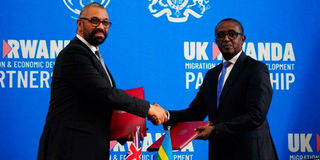UK signs controversial new migration treaty with Rwanda

Britain's Home Secretary James Cleverly (L) and Rwanda's Foreign Minister Vincent Biruta exchange documents after signing a new treaty in Kigali, Rwanda on December 5, 2023. PHOTO | AFP
What you need to know:
- The agreement, which UK Prime Minister Rishi Sunak says is crucial to achieve his pledge of slashing irregular migration before a general election expected next year, was signed in Kigali.
Kigali. Britain and Rwanda signed a new treaty on Tuesday in a bid to revive a controversial proposal by London to transfer migrants to the East African country that was blocked by the UK courts.
The agreement, which UK Prime Minister Rishi Sunak says is crucial to achieve his pledge of slashing irregular migration before a general election expected next year, was signed in Kigali.
It was penned by Rwandan Foreign Minister Vincent Biruta and British interior minister James Cleverly, who travelled to the Rwandan capital to salvage London's stalled bid to send migrants to Rwanda after the UK Supreme Court deemed the arrangement unlawful.
The judges sided with a lower court decision that the policy was incompatible with Britain's international obligations because Kigali could forcibly return migrants to places where they could face persecution.
Sunak had vowed to persevere with the contentious project by securing a new treaty that he promised would "address concerns" raised in the Supreme Court's ruling last month.
"There is a lot of desire to continue to improve the process. The UK and Rwanda are working on this because it is important," Cleverly said at a joint press briefing in Kigali.
Biruta added that Rwanda "is very committed to this partnership and that is why we worked with the UK government to address the concerns raised by the Supreme Court".
The UK government said that under the new treaty, Rwanda would be bound by international law not to return people to a country where their life or freedom would be in danger -- a process known as refoulement.
It added that a new body consisting of judges with a mixture of nationalities would be established to hear individual appeals.
Legal challenges
Alain Mukuralinda, deputy spokesman for Rwanda's government, said the two countries would "set up a joint tribunal with both Rwandan and UK judges in Kigali... to make sure that none of the immigrants sent to Rwanda is deported to their country".
"This tribunal will have to be approved and voted (on) by parliaments from both countries," he added.
The UK Supreme Court decision last month was a major setback for Sunak, who also plans to pass "emergency legislation" in parliament to designate Rwanda a safe country to end legal challenges.
"I'm fed up with our Rwanda policy being blocked," Sunak wrote in The Sun tabloid Tuesday.
"I've got the government working on emergency laws to end the merry-go-round so that we can fix this problem once and for all -- and stop the boats."
A UK-Rwanda migration "partnership" agreed in April last year envisaged sending to Kigali anyone who has made what London calls "dangerous or illegal journeys" to Britain on small boats from Europe or hidden in lorries.
'Rwanda is a safe country'
The first deportees were aboard a plane to fly there in June 2022 when a last-minute European Court of Human Rights injunction prevented any deportations, prompting further court action.
The plan has also come under fire from activists, with Yasmine Ahmed, UK director at Human Rights Watch, urging the British government on Tuesday to "open its eyes to Rwanda's track record of human rights violations, including against refugees and asylum seekers".
Rwanda has been de facto led by Paul Kagame since the 1994 genocide, and the veteran president is seeking to extend his iron-fisted rule in elections next year after winning nearly 99 percent of the vote in 2017.
The government in London insists the bilateral scheme is crucial to deter "illegal" immigration across the Channel from France on inflatable vessels -- an emotive issue set to feature prominently in a nationwide election that must be held by January 2025.
Nearly 30,000 have made the perilous journey this year -- down on the nearly 46,000 who crossed in 2022, but still far short of meeting Sunak's vow to "stop the boats".
"We are clear that Rwanda is a safe country, and we are working at pace to move forward with this partnership to stop the boats and save lives," Cleverly said in a statement ahead of his trip.
But the Law Society of England and Wales, a professional association, said it "remains unclear" how the new treaty would convince the Supreme Court judges.
"Neither a treaty nor domestic legislation can overnight provide adequate means of safeguarding the rights of people removed to Rwanda," said Nick Emmerson, the society's president.





